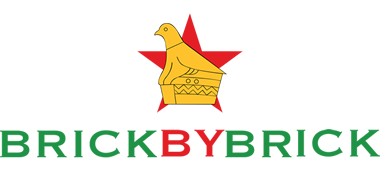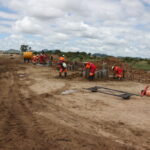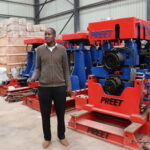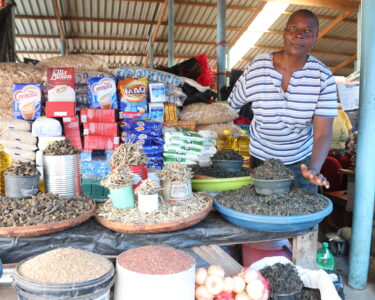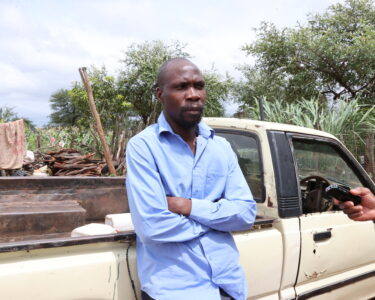The Second Republic’s “Zimbabwe is open for business” mantra has received a warm response from big-time investors (both local and foreign), who are either bringing in fresh investment or expanding already existing investments in the country. One of them, the Masvingo-based steelmaker, SIMBI (Pvt) Ltd, has taken 300 hectares of land to expand its operations on the outskirts of Masvingo city, bringing high hopes of hundreds and hundreds of employment opportunities, reports Baffour Ankomah.
Employment opportunities in Masvingo city are going to increase exponentially when SIMBI (Pvt) Ltd, a subsidiary of the Steelmakers Group of companies, completes a multi-million-dollar expansion in the Masvingo industry area.
SIMBI, which stands for Sponge Iron Mining and Beneficiation Industry, has been in Masvingo since 2006, after its incorporation in 2004. Until 2021, it was operating on 100 hectares of land off the Bulawayo Road Westview end of the Masvingo industry area, not far from the city centre.
From that location, SIMBI, owned by Indian investors, has become the market leader in coal-based sponge iron manufacturing in Zimbabwe. It mines iron ore near the Nyuni Hills at Glenlivet, 40 km away from Masvingo city, and coal near Chiredzi.
Since 2004, SIMBI has been the sole sponge iron producer and distributor in Zimbabwe. Sponge iron, also called Direct Reduced Iron (RDI), is used as a raw material in the manufacture of steel. It is often used as a substitute for scrap.
SIMBI’s parent company, Steelmakers Ltd, began operations in Zimbabwe in 1998, riding on a symbiotic relationship with the Zimbabwe Iron and Steel Company (ZISCO) in Redcliff. At the time, Steelmakers’ operations revolved around two rolling mills in Redcliff to produce light and medium structural steel sections from bloom and billets supplied by ZISCO.
Since then, Steelmakers has grown into new product ranges and value addition. The company has given birth to several subsidiaries, including SIMBI Masvingo, SIMBI Glenlivet, Coal Zimbabwe at Chiredzi, and the Redcliff operations (involving 4 rolling mills, a silica crushing plant, an oxygen gas division, a foundry, and a water treatment plant).
The breadth of Steelmakers’ operations has enabled SIMBI to not only produce sponge iron, but also coal, steel, and oxygen to consumers across Zimbabwe. It also exports a substantial tonnage of sponge iron to South Africa. At its peak, before low steel prices globally and water and electricity shortages forced SIMBI to scale down production in August 2019, it was producing 60,000 tonnes of sponge iron per year.
The company employs 300 people for the Masvingo operation alone, and has become a major iron ore processing plant in the country after ZISCO. SIMBI’s success has boosted the city of Masvingo’s economy through employment creation and diversification, while sponge iron exports have brought the country considerable forex earnings.
Current operation
In 2021, SIMBI applied to the Masvingo City Council for an extra 200 hectares of land adjacent to its already existing 100-hectare property at the Masvingo industrial area to expand its operations, to cover a new iron beneficiation plant that will produce a variety of steel products.
The City Council obliged, and today SIMBI is on the verge of much bigger things just on the outskirts of Masvingo city. The beneficiation plant is expected to create several hundreds of additional jobs in Masvingo, and stop SIMBI from ferrying sponge iron to its sister plant in Kwekwe for further processing.
For the national economy, this is very good news as the expansion means increased production and higher earnings of forex for the nation.
The expansion will see the building of a 45 MW electricity plant to meet SIMBI’s power needs, with the surplus going into the national grid.
Expansion
On 16 February 2023, Tatenda Chitapi, SIMBI’s accountant, conducted a visiting team of Brick by Brick editors and provincial government officials around SIMBI’s expansion project now under way off the Bulawayo Road.
We saw intensive work being done on a new one-kilometre-long shed that will house the new rolling mills and smelters. Chitapi said the expansion, being done in 3 phases, would take 5 years to complete. Three private companies, led by the Harare-based Kalamain Construction, are involved in the expansion construction.
“Progress is on course, there is positive movement towards achieving the plans,” Chitapi told Brick by Brick. “We are looking forward to achieving the milestones in the shortest possible time as there is cooperation among all the parties. All the stakeholders are contributing positively towards the expansion. Currently our products are for the local market, but with the expansion the target is both local and international markets.”
Basically, SIMBI wants to create a one-stop production house at the Masvingo site, which will change the parent company’s current system where steel products are manufactured in Redcliff, while sponge iron is produced at SIMBI Masvingo. After the expansion, everything will be produced under one roof – at SIMBI Masvingo.
“The sponge iron will be produced here, we will take it to the smelters here, we will roll it here, and we will produce the final product here. Which is good news for Masvingo,” Chitapi said.
Raw materials for the operation will come from Clenlivet (iron ore) and coal from Chiredzi.
“The major raw material in making sponge iron is coal, so we take coal from our sister company in Chiredzi,” Chitapi explained. “We also use limestone. All these raw materials are obtained locally.
“We are closer to the raw materials here in Masvingo than in Redclif. That is one of the strategic reasons why SIMBI is expanding in Masvingo. The attraction is the proximity to raw materials and the availability of land space. Without this space, the expansion would not have been possible here.”
Chitapi told Brick by Brick that some of the expansion’s capital equipment had already arrived in Masvingo from abroad. “Some are on the way, and some are already in Harare to be moved to this site,” he said.
“As far as planning is concerned, a lot of equipment has already been moved to Zimbabwe. Inside this shed, there is a lot of material that has already been procured,” Chitapi added, as he conducted the Brick by Brick team through a big shed full of equipment.
In the end, Masvingo will be the better for it, as the expansion is sure to put more money in the local economy by way of increased employment and taxes, and ultimately this will cascade into the national economy.

